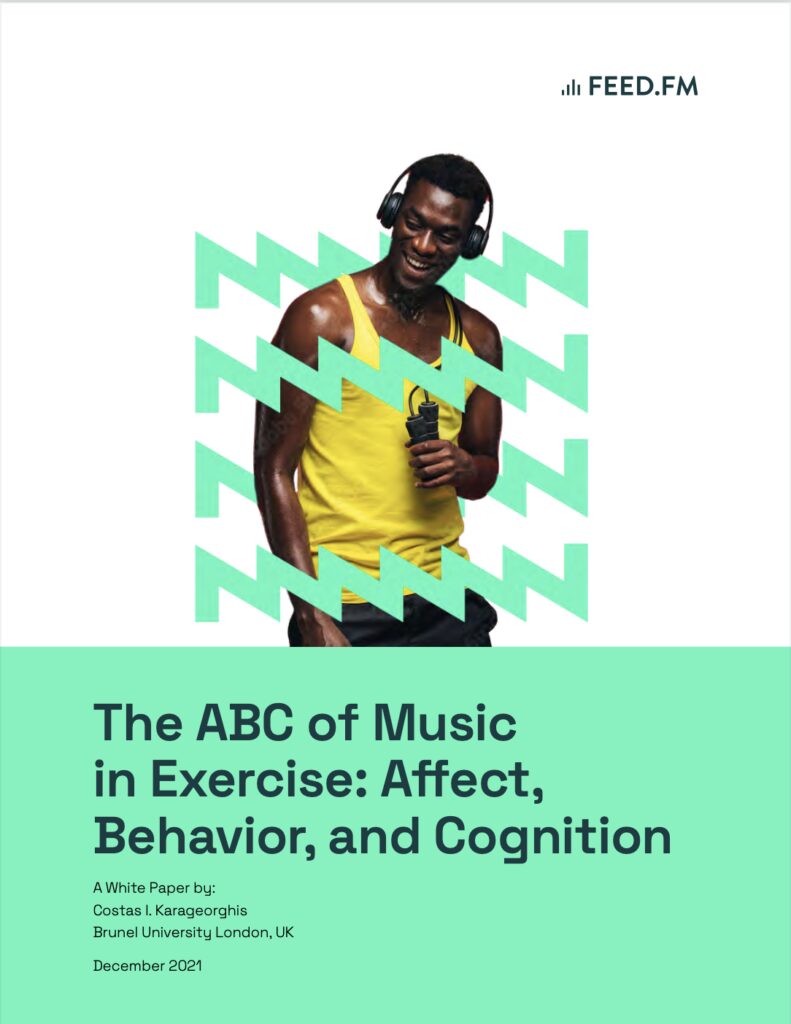How Does Choice of Music Improve a Workout?
Partnership
Sponsored By Feed.fm

How does the right music make workouts more fun and effective? A new study commissioned by Feed.fm breaks it all down for you
Comfortable leggings and the right footwear can help one feel and look good during a grueling workout. But a growing body of research indicates that choosing the right music for different parts of an exercise routine can make the difference between a satisfactory workout and a great one.
Feed Media Group (parent company of Feed.fm) helps digital fitness companies tap into music’s ability to energize mind and body and improve the way we exercise. They teamed up with Brunel University London Sport and Exercise Psychology professor Costas Karageorghis, to share the scientific evidence behind music in exercise.

In a white paper published in January entitled “The ABC of Music in Exercise: Affect, Behavior, and Cognition” Professor Karageorghis, who has spent more than twenty years doing academic research in the field of sports and exercise psychology, sheds light on how music impacts exercise through three distinct psychological and neuroscientific components: Affect (underlying emotion), Behavior (exercise performance) and Cognition (thought processes).
Affect: Setting the Exercise Mood

Feed Media Group COO, President, and Co-Founder Lauren Pufpaf has shared data showing that the “right music at the right time” during a workout can boost one’s mood and efficiency, and make one forget about impending discomfort and fatigue.
Professor Karageorghis’ white paper affirms this with his “golden thread” theory. The first prong of his theory, “Affect,” which he defines as the “underlying emotion,” or mood is felt during the pre-workout stage. According to Professor Karageorghis, the “pre-task music” can “alter an exerciser’s affective or emotional state,” either positively or negatively: “People seldom need relaxing music prior to an exercise session (unless they are anxious about going to the gym); rather they need tracks that will engender an active state.”
Professor Karageorghis adds, “with in-task usage, a key role of music is to elevate affect and lower the exerciser’s perception of exertion. Music can temper the shift toward negative affect that is unavoidable during intense forms of exercise.”
In other words, music can be a good distraction from the task of exercise, which depending on the workout can cause stress on the body and mind.
Behavioral: Improving Physical Performance

The second element of the findings deals with music’s ability to enhance performance during the workout. Professor Karageorghis’s report shows that listening to music during track or treadmill running enhances one’s physical performance by a factor “as great as 15%,” proving how effective music is as a stimulus used to increase work output while reducing perceived exertion.
Specifically, the beats-per-minute measure (BPM) of a song can affect one’s mood and effectiveness where exercise is concerned. Professor Karageorghis found that for other than warm-ups and cool-downs, a medium (120-125 bpm) or fast tempo (135-140) beat provides for optimal performance, with increased dissociation, exercise enjoyment, and remembered pleasure in comparison to the use of no music at all.
Music can be used as an aesthetic stimulus capable of rewiring the brain before, during, and after exercise to promote the enjoyment of one’s workout and lessen feelings of fatigue. Music has the ability to induce positive behavioral changes which elevate dopamine levels in the brain, thereby influencing the emotional experience of one’s workout. Professor Karageorghis has referred to music as a “legal, performance-enhancing drug,” one that is void of any unpleasant side effects.
Cognitive: The Motivating Factor

The cognitive aspect, or music’s effect on the thought processes of the brain before and during exercise, was addressed as the final element of the white paper. Professor Karageorghis found that a tune’s rhythm and lyrics can change the brain in preparation for and during exercise: “There is a well-established ‘rhythm response’ associated with the use of music during exercise.” People’s “innate predisposition” to synchronize a song’s BPM with their physical movement generates activity in the brain that is pleasing to the mind and body. He also stresses the importance of song lyrics in one’s choice of workout music: “Full advantage should be taken of lyrical content to provide affirmation, empowerment, and motivation.”
This activity correlates with the importance of choosing the right music before and during exercise. Brain arousal, due to the choice of music, before exercise, inspires the workout task at hand. During a workout, music has the power to distract from fatigue and invigorates rhythmic balance between music and exercise functionality. Eventually, the exerciser is led to a calm and revitalized state by the end of a workout.
Professor Karageorghis recommends that listeners who want the optimal ABC (Affect, Behavioral and Cognitive) elements in their workout base their choice of exercise music on personal preference while considering age, socio-cultural background, and intensity of exercise. Expertly curated streaming platforms like Feed.fm’s B2B music platform can help users find music for this purpose with ease and efficiency.



